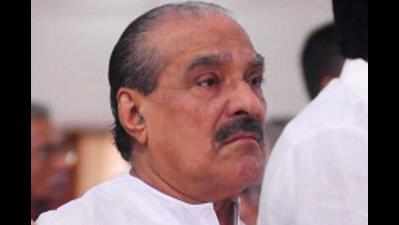- News
- City News
- thiruvananthapuram News
- At this point, even ‘Josemon’ is out of Mani’s manifesto
Trending
This story is from August 8, 2016
At this point, even ‘Josemon’ is out of Mani’s manifesto

For over 50 years, Mani’s politics has been revolving around personal agendas.
THIRUVANANTHAPURAM: In the preface to the latest edition of ‘Theory of the Toiling Class’, KM Mani wrote, “…the conscientious positions I held in the political and public life prompted me to ponder further about the ideal ideology to be tracked for collective advantage”. The term ‘collective’ frequently used by Mani in his speeches and writings often means him and his son Jose K Mani.On Sunday, while Mani announced his decisions to part ways with the UDF, the ‘collective’ further narrowed to him only.
For over 50 years, Mani’s politics has been revolving around personal agendas. Almost all splits in the Kerala Congress were for protecting his interests. For him, ideology was nothing but another kurta that was changed when, he felt, it was soiled.
In 1965, he switched over to newly-formed Kerala Congress overnight by quitting as Kottayam DCC secretary to contest from Pala assembly constituency that was formed a year ago. The 31-year old handsome, God-fearing, English-speaking and well-behaved young lawyer became a darling of the aristocratic Christians and the dominant Roman Catholic Church.
Mani won 51% votes in the first election held in Pala and beat the communist party candidate by 9,585 votes. The victory march he launched has been continuing and in 2016 he trounced NCP’s Mani C Kappan for the third consecutive time to reach the assembly for a record 13th term. Mani had been part of 11 governments in the state and holds the record of the longest-serving minister in Kerala.
While Congress candidates fell flat in sure seats unable to withstand bar bribery allegations, Mani and his men survived, thanks to the diplomatic channels he had opened with political, social and communal organizations.
Mani is equally acceptable to NSS general secretary G Sukumaran Nair and SNDP general secretary Vellappally Natesan. The LDF, post-2016 poll, reviewed that the support from Nair and Natesan had helped Mani. When the church took a neutral stand, Ezhava and Nair votes helped Mani to uphold his record. Even his equidistance policy has its roots at Perunna where he is a regular visitor.
Earlier, Mani’s had swung between fronts to fulfil his ambitions, this time it was fuelled by fear factor. Mani was one of the first visitors CM-designate Pinarayi Vijayan had. Not so long ago, Vijayan’s emissaries had secret parleys with Mani to sabotage the UDF government that was surviving on a wafer-thin margin.
With Vijayan as CM and Jacob Thomas as vigilance director, Mani has much to fear. By sending feelers to Vijayan that he is available, Mani hopes to neutralize the vigilance probes against him. Chances of him shaking hands with Kummanam and Amit Shah are low at this juncture though it will help his son to achieve his ministerial ambitions.
At this point, even ‘Josemon’ is out of Mani’s manifesto.
For over 50 years, Mani’s politics has been revolving around personal agendas. Almost all splits in the Kerala Congress were for protecting his interests. For him, ideology was nothing but another kurta that was changed when, he felt, it was soiled.
In 1965, he switched over to newly-formed Kerala Congress overnight by quitting as Kottayam DCC secretary to contest from Pala assembly constituency that was formed a year ago. The 31-year old handsome, God-fearing, English-speaking and well-behaved young lawyer became a darling of the aristocratic Christians and the dominant Roman Catholic Church.
Mani won 51% votes in the first election held in Pala and beat the communist party candidate by 9,585 votes. The victory march he launched has been continuing and in 2016 he trounced NCP’s Mani C Kappan for the third consecutive time to reach the assembly for a record 13th term. Mani had been part of 11 governments in the state and holds the record of the longest-serving minister in Kerala.
One of the reasons Mani had raised for taking the harsh decision was the Congress’ efforts to defeat him at Pala. It is not a secret that a good number of Congress workers, led by veteran M M Jacob who was defeated by Mani twice at Pala, had worked to ensure Mani’s defeat. But, like how he stood tall withering the VS wave that uprooted giants like KR Gowri, PK Kunhalikutty and R Balakrishna Pillai in 2006, Mani survived the ‘anti-corruption wave’ in 2016.
While Congress candidates fell flat in sure seats unable to withstand bar bribery allegations, Mani and his men survived, thanks to the diplomatic channels he had opened with political, social and communal organizations.
Mani is equally acceptable to NSS general secretary G Sukumaran Nair and SNDP general secretary Vellappally Natesan. The LDF, post-2016 poll, reviewed that the support from Nair and Natesan had helped Mani. When the church took a neutral stand, Ezhava and Nair votes helped Mani to uphold his record. Even his equidistance policy has its roots at Perunna where he is a regular visitor.
Earlier, Mani’s had swung between fronts to fulfil his ambitions, this time it was fuelled by fear factor. Mani was one of the first visitors CM-designate Pinarayi Vijayan had. Not so long ago, Vijayan’s emissaries had secret parleys with Mani to sabotage the UDF government that was surviving on a wafer-thin margin.
With Vijayan as CM and Jacob Thomas as vigilance director, Mani has much to fear. By sending feelers to Vijayan that he is available, Mani hopes to neutralize the vigilance probes against him. Chances of him shaking hands with Kummanam and Amit Shah are low at this juncture though it will help his son to achieve his ministerial ambitions.
At this point, even ‘Josemon’ is out of Mani’s manifesto.
End of Article
FOLLOW US ON SOCIAL MEDIA










